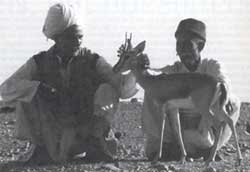Ready to die
 INDIA is a country where legislators feast on endangered species and the favourite pastime of actors is hunting. Here the story of a marginalised community ready to lay down their lives to protect animals sounds like a fairy tale. But nothing surprises "mystic" India. Here, a religion that espouses animal sacrifices, at the same time, instructs followers to protect the same at the cost of one's life, if necessary.
INDIA is a country where legislators feast on endangered species and the favourite pastime of actors is hunting. Here the story of a marginalised community ready to lay down their lives to protect animals sounds like a fairy tale. But nothing surprises "mystic" India. Here, a religion that espouses animal sacrifices, at the same time, instructs followers to protect the same at the cost of one's life, if necessary.
Members of a community who will go to the extent of sacrificing their lives to save an animal, the Bishnois inhabit the sparse jungles of the Thar desert in western Rajasthan. But, if not for actor Salman Khan, the Bishnois would have remained a mere object of academic research. Pitted against the might of a gumtotting celluloid star, the Bishnois did not shy away when they saw the star and his friends killing an animal they revere most - the Blackbuck.
For the Bishnois, who succeeded in putting the filmstar behind bars, it was part of their daily routine. Only this time they had the national media zooming in on them as a Bollywood hero had a lead role in the conflict.
Willing to Sacrifice by B V P Rao is not one of those .topical" documentaries that are churned out by the dozen after incidents like this take the nation by storm. The 25-minute documentary was slated for release at what eventually turned out to be the "right time".
The film has been spun in the tale-within-a-tale mode. The story revolves around an individual, Nihal Chand, and his 500-year-old religious sect, the Bishnois. Many people and communities around the world are known to care for the environment, but what makes the Bishnois unique is the fact that, if need be, they are willing to sacrifice their lives to protect the environment.
The film begins with Nihal Chand losing his life at the hands of poachers in 1996. His father Hanuman Singh and wife Sampati Devi are bereaved, but proud of the way in which he died. Like many of his community members in the past, Nihal Chand is a martyr. His heroic story is also the story of his community.
The film gradually shifts the focus from Nihal Chand to his community. The Bishnois (literally meaning "20 plus nine") takes its name from the 29 principles propounded by Sant Jambeshwar, the founder of their faith. It moves from an individual's sacrifice in the 20th century to the famous massacre in the mid-18th century.
Legend has it that way back in 1731, the King of Jodhpur ordered the felling of kheiri trees in Khejri village. The Bishnois would not let their trees be chopped down. In the battle with the royal troops, 363 Bishmois, both men and women, lost their lives.
The memory of the Khejri incident is not just a part of Bishnois folklore today. It forms a part of their daily commitment, exemplified by the sacrifices made by the likes of Nihal Chand and the more recent crackdown on celluloid hunters. For centuries now, protecting the wildlife has been an integral part of the Bishnois' tradition. Chasing poachers and thugs have always been a dangerous occupation.
Taking into consideration that the documentary is a debut by filmmaker Rao, Willing to Sacrifice scores high on the research that went behind it. However, it slips on the technical aspect. The cinematography is very slipshod and so is the editing. Bland interviews and just close-ups do little justice to the medium of cinema. The saving grace is Mayukb Hazarika's music. Though a newcomer, Hazarika already has his album busting the music cbarts. He is also a p ro fe ssi o n al I y - I r a i n e d cinematographer. Perhaps he should have gone behind the lens himself. Bhaskar Bliattacharya's rending of the script is also flawless.
On the whole, though the film is a sincere effort by a novice, it fails to portray anything new. It trudges along the beaten track of eulogising the frequently- glorified community. There is absolutely no attempt to take a deep look at a commu- nity that has become used to media attention. And, in fact, become quite deft at handling publicity.
Related Content
- Order of the National Green Tribunal regarding discharge of domestic waste water and untreated industrial waste water into river Ganga, Varanasi, Uttar Pradesh, 23/05/2025
- Judgment of the Supreme Court regarding district survey report for environmental clearance, 08/05/2025
- Delhi Jal Board report on sewage treatment plants, 08/05/2025
- 21st Livestock Census Animal Breeds- A Ready Reckoner
- Status report filed by Chennai Metropolitan Water Supply & Sewerage Board regarding water stored in quarries like Sikkarayapuram, Tamil Nadu, 28/03/2025
- Report by Nellore Municipal Corporation regarding restoration of groundwater levels in Krishnapatnam Node, Nellore district, Andhra Pradesh, 24/02/2025
